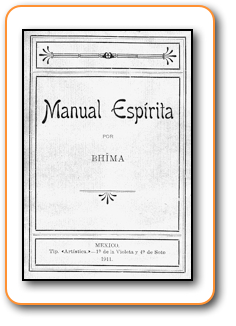
From
Manual espírita by "Bhima" (Francisco
I. Madero), 1911.
English translation by C.M. Mayo, from:
...Metaphysical
Odyssey Into the Mexican Revolution:
...Francisco I. Madero and His
Secret Book, Spiritist Manual
...By C.M. Mayo (Dancing
Chiva, 2014)
 REINCARNATION (EXCERPT)
REINCARNATION (EXCERPT)
Q. Can you tell me something in support of the doctrine of reincarnation?
A.This doctrine has been accepted by the greatest philosophers
of antiquity and preached by the great missionaries, as I explained
in the historical part, and I should like to underline similarities
among the doctrines as taught by Krishna in India, Hermes in
Egypt, and Christ in Judea, as with other great philosophers,
and, since the middle of the past century,.by the uncounted spirits
that have come to communicate with with humanity. This doctrine
is noy only supported by revelation in accord with the great
missionaries, but it is the most rational philosophical doctrine
and for all the problems as yet unexplained by other philosophical
doctrines, it presents the most logical explanation.
Q. Can you tell me what those problems are?
A. A great number
of issues remain obscure when we analyze them the lense of other
doctrines. For example: the very notable inequality among human
beings, some rich, others poor, some happy, others melancholy;
some born with illnesses that accompany them to the grave and
make their life miserable, while others, full of health, seem
to enjoy smiling fortune in everything.
In the same way we observe that many men who, during their lives,
commit great crimes do not seem to receive punishment before
leaving this world, while others are inevitably their victims
and suffer all kinds of vexations without seeing justice in their
lifetime.
Another problem other philosophical doctrines leave unresolved
is the satisfactory explanation for the birth of children who,
from earliest infancy, show themselves to be true geniuses and
demonstrate extraordinary talents, whether for music, or some
branch of science, etc.
Lastly, no religion nor system of philosophy has been able to
satisfactorally explain why children of the same parents sometimes
have such different characters, ideas and tendencies.
The materialist view does not offer a satisfactory explanation
for these phenomena, for, being logical in its principles, it
must assume chance determines the qualities of each individual
at birth, not only from the moment he begins to have consciousness,
but some years after his birth, and so he has a wealth of qualities,
good and bad, which he did not acquire himself, nor did his parents
attempt to transmit it in the moment of conception.
If chance is what determines each human being's aptitudes, we
would not see that very harmonious and concordant similarity
among the works and teachings of the great men, who by mysterious
and various paths, have accelerated humanity's evolution toward
progress and happiness.
Neither would we observe that admirable opportunity by which,
in the most propitious moments, superior men have come to earth,
whether to save humanity from grave dangers or lead it on a new
path.
According to Catholicism and the Protestant sects, human life
begins at the moment of birth and the qualities it has are given
by the grace of God, who, being omnipotent and creator of all
that exists, assigns to each creature its abilities at the moment
of birth.
This doctrine is simple and simply monstrous, for it makes God
is fundamentally unjust.
In contrast, with the doctrine of reincarnation all the above
mentioned difficulties disappear. It is no longer by chance nor
divine caprice that qualities of each human being are determined;
it is the very same being who brings into each incarnation the
qualities and aptitudes it aquired in previous incarnations,
whether in the planetary or the interplanetary.




